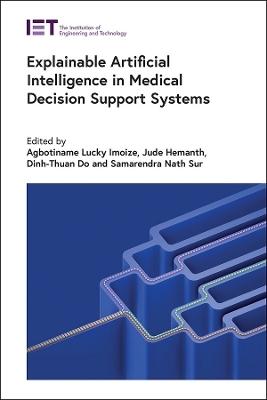
Explainable Artificial Intelligence in Medical Decision Support Systems
Institution of Engineering and Technology (Verlag)
978-1-83953-620-5 (ISBN)
Medical decision support systems (MDSS) are computer-based programs that analyse data within a patient's healthcare records to provide questions, prompts, or reminders to assist clinicians at the point of care. Inputting a patient's data, symptoms, or current treatment regimens into an MDSS, clinicians are assisted with the identification or elimination of the most likely potential medical causes, which can enable faster discovery of a set of appropriate diagnoses or treatment plans. Explainable AI (XAI) is a "white box" model of artificial intelligence in which the results of the solution can be understood by the users, who can see an estimate of the weighted importance of each feature on the model's predictions, and understand how the different features interact to arrive at a specific decision.
This book discusses XAI-based analytics for patient-specific MDSS as well as related security and privacy issues associated with processing patient data. It provides insights into real-world scenarios of the deployment, application, management, and associated benefits of XAI in MDSS. The book outlines the frameworks for MDSS and explores the applicability, prospects, and legal implications of XAI for MDSS. Applications of XAI in MDSS such as XAI for robot-assisted surgeries, medical image segmentation, cancer diagnostics, and diabetes mellitus and heart disease prediction are explored.
Agbotiname Lucky Imoize is a lecturer in the Department of Electrical and Electronics Engineering at the University of Lagos, Nigeria and a research scholar at Ruhr University Bochum, Germany. He is a Fulbright fellow, a senior member of the IEEE, and a registered engineer. He has published over 90 articles and conference papers, two edited textbooks, and five book chapters. His research interests are 6G wireless communication, artificial intelligence, and the Internet of Things. Jude Hemanth is a professor at Karunya University, Coimbatore, India. He has delivered more than 100 keynote talks and invited lectures at international conferences and workshops, and has authored more than 100 research papers and 27 edited books. His research areas include computational intelligence and image processing. Dinh-Thuan Do is a research scientist in the Department of Electrical Engineering, University of Colorado Denver, USA. He won a Golden Globe Award from the Vietnam Ministry of Science and Technology in 2015. He has published over 200 journal and conference papers, one textbook, two edited books and eight book chapters. His research interests include signal processing in wireless communications networks, full-duplex transmission, and energy harvesting. Samarendra Nath Sur is an assistant professor in the Department of Electronics & Communication Engineering at Sikkim Manipal Institute of Technology, India. His research interests include wireless communication, signal processing, and remote sensing. He has published more than 77 SCI/Scopus indexed international journal and conference papers, four edited textbooks, and five book chapters. He is a senior member of the IEEE and associate member of the Institution of Engineers (India) (IEI).
Chapter 1: Explainable artificial intelligence (XAI) in medical decision systems (MDSSs): healthcare systems perspective
Chapter 2: Explainable artificial intelligence (XAI) in medical decision support systems (MDSS): applicability, prospects, legal implications, and challenges
Chapter 3: Explainable Artificial Intelligence-based framework for medical decision support systems
Chapter 4: Prototype interface for detecting mental fatigue with EEG and XAI frameworks in Industry 4.0
Chapter 5: XAI for medical image segmentation in medical decision support systems
Chapter 6: XAI robot-assisted surgeries in future medical decision support systems
Chapter 7: Prediction of erythemato squamous-disease using ensemble learning framework
Chapter 8: Security-based explainable artificial intelligence (XAI) in healthcare system
Chapter 9: Explainable dimensionality reduction model with deep learning for diagnosing hypertensive retinopathy
Chapter 10: Understanding cancer patients with diagnostically influential factors using high-dimensional data embedding
Chapter 11: Explainable neural networks in diabetes mellitus prediction
Chapter 12: A KNN and ANN model for predicting heart diseases
Chapter 13: Artificial Intelligence-enabled Internet of Medical Things for COVID-19 pandemic data management
Chapter 14: A deep neural network for the identification of lead molecules in antibiotics discovery
Chapter 15: Statistical test with differential privacy for medical decision support systems
Chapter 16: Automated decision support system for diagnosing sleep diseases using machine intelligence techniques
Chapter 17: XAI methods for precision medicine in medical decision support systems
Chapter 18: The psychology of explanation in medical decision support systems
| Erscheinungsdatum | 31.01.2023 |
|---|---|
| Reihe/Serie | Healthcare Technologies |
| Verlagsort | Stevenage |
| Sprache | englisch |
| Maße | 156 x 234 mm |
| Themenwelt | Informatik ► Weitere Themen ► Bioinformatik |
| Naturwissenschaften ► Biologie | |
| ISBN-10 | 1-83953-620-9 / 1839536209 |
| ISBN-13 | 978-1-83953-620-5 / 9781839536205 |
| Zustand | Neuware |
| Informationen gemäß Produktsicherheitsverordnung (GPSR) | |
| Haben Sie eine Frage zum Produkt? |
aus dem Bereich


